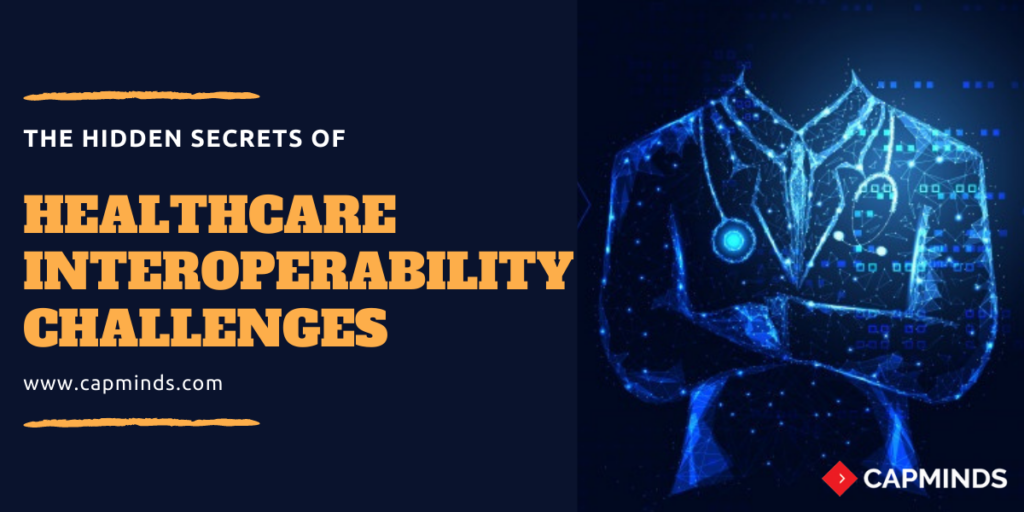Hidden Secrets Of Healthcare Interoperability Challenges
Today, improved healthcare interoperability is everyone’s top priority. Both the public and private healthcare organizations are working across the industry to facilitate seamless health data exchange between health IT systems to coordinate care across various health settings nationwide.
Even though the health IT standards and health information exchange have yielded some technological improvements, but still there are some challenges in achieving true interoperability. Everyone might think like what are the challenges in healthcare interoperability? Here are the major healthcare interoperability challenges everyone should be aware of in order to achieve true interoperability for excellent care delivery and improved patient health outcomes.
RELATED: PRIORITIZING YOUR HEALTHCARE INTEROPERABILITY : EXPERT’S GUIDE
Top 4 Challenges In Healthcare Interoperability
1. The absence of a standardized way to identify patients
Do you know how patients are identified correctly? Most commonly they will be identified by their name, date of birth, and Social Security number. Still today, there is no consistent method to identify a patient across the healthcare industry in an accurate way. Because each piece of information will be stored in different ways and in different systems.
Then how it is possible to access patient health data completely and accurately? The only solution is the creation of a national unique patient identifier. The patient identifier would be similar to an individual’s Social Security number which will be used by patients at the time of care.
The unique patient identifier is a code that identifies, sorts, and categorizes individual health data no matter what system or provider used. This benefit in the way that medical organizations can efficiently and accurately exchange patient health information. So overcoming this challenge will definitely eliminate the errors caused by mismatched patient records in EHRs.
As health information exchange continues to evolve day by day, the need for an accurate and standardized way to find patient health records is becoming very important. Thus, the lack of a national uniform patient identification system has resulted in increased healthcare facility costs, inefficient health data exchange, and patient safety threats.
Thus, before industry-wide interoperability can become a reality, federal agencies will need to prioritize standardizing all aspects of patient health record exchange.
RELATED: HEALTHCARE INTEROPERABILITY: A WIN WIN APPROACH FOR PATIENTS & PROVIDERS
2. The absence of health IT interoperability standards across the industry
The second challenge is the difficulty of enforcing standards for health IT interoperability. Today’s healthcare technology makes it difficult to share health information from one electronic health record software or other healthcare technology to another. The external data fields and mismatched fonts, mean that data has to be manipulated before it can be imported into another EHR system.
Lack of interoperability standards can disturb the seamless health data exchange by complicating transactions and additional barriers to the flow of information. The adoption of health data standards serves as the basis for enabling interoperability across healthcare sectors and between electronic health record systems.
The numbers of different standards development organizations (SDOs) create, define, update, and maintain health data standards through collaborative processes that involve health IT users, but there is no single standard.
Today, the U.S healthcare system started moving from a fee-for-service to a value-based health care system focusing on outcomes and populations. As more cost having been spent on EHR implementation, the healthcare system must find efficient ways to connect the patient data accurately. This lack of a common standard for capturing, transmitting, receiving, storing, and managing patient health data causes inaccuracies and delays – a major disadvantage to interoperability efforts.
RELATED: FHIR: A NEW PATH TOWARDS HEALTHCARE INTEROPERABILITY
3. Difficulty In enforcing industry-wide interoperability measurement standards
The next big challenge is the need to enforce interoperability measurement standards across the industry. Without the ability to measure the outcomes, the healthcare organizations can’t able to work on the areas which need more improvement and so no true interoperability can be achieved.
With new interoperability improvement initiatives that are getting into progress across the industry, federal agencies need a way to measure the progress of these initiatives by assessing the state of health IT interoperability in a consistent way.
The common challenge faced by healthcare providers, their vendor partners, and payers is the lack of a standardized way to measure the impact of interoperability delays. So, if the providers can able to identify the issues across the entire healthcare chain, then they can easily analyze and make changes that can improve the quality of care and result in better patient outcomes.
RELATED: HERE’S HOW INTEROPERABILITY CAN IMPROVE PATIENT CARE
4. The need to end information blocking by vendors
The practice of information blocking is a major impediment to healthcare interoperability. While the information is shared correctly, some of the technological organizations then charge fees for transmitting data outside the system. Even though blocking patient health information exchange is considered to be illegal, this still remains a problem and an important challenge to overcome to achieve true interoperability.
Final Thoughts
The global healthcare interoperability market is expected to register a healthy CAGR of 13.2% in the forecast period of 2019-2026.
Developing a national patient identifier, improving standardization and collaboration across the industry, and ending information blocking are all remaining to be the great challenges towards achieving true healthcare interoperability. However, a great deal of movement toward interoperability advancements that will likely continue despite these challenges.
To overcome these challenges and achieve widespread interoperability, CapMinds healthcare interoperability solutions – HL7 FHIR SMART integration services will help you to achieve true interoperability and to deliver improved patient experiences and better patient care outcomes.




